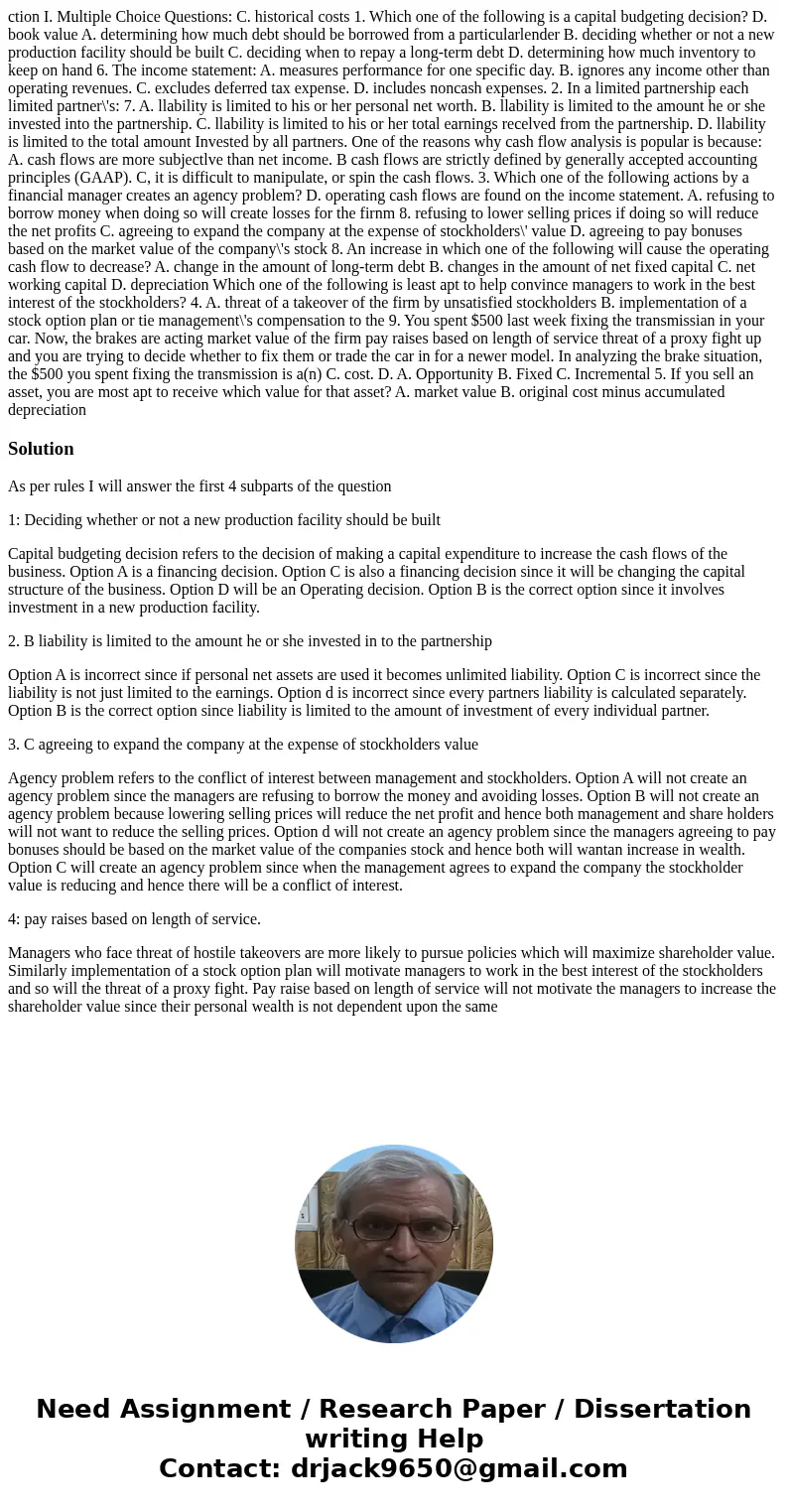ction I. Multiple Choice Questions: C. historical costs 1. Which one of the following is a capital budgeting decision? D. book value A. determining how much debt should be borrowed from a particularlender B. deciding whether or not a new production facility should be built C. deciding when to repay a long-term debt D. determining how much inventory to keep on hand 6. The income statement: A. measures performance for one specific day. B. ignores any income other than operating revenues. C. excludes deferred tax expense. D. includes noncash expenses. 2. In a limited partnership each limited partner\'s: 7. A. llability is limited to his or her personal net worth. B. llability is limited to the amount he or she invested into the partnership. C. llability is limited to his or her total earnings recelved from the partnership. D. llability is limited to the total amount Invested by all partners. One of the reasons why cash flow analysis is popular is because: A. cash flows are more subjectlve than net income. B cash flows are strictly defined by generally accepted accounting principles (GAAP). C, it is difficult to manipulate, or spin the cash flows. 3. Which one of the following actions by a financial manager creates an agency problem? D. operating cash flows are found on the income statement. A. refusing to borrow money when doing so will create losses for the firnm 8. refusing to lower selling prices if doing so will reduce the net profits C. agreeing to expand the company at the expense of stockholders\' value D. agreeing to pay bonuses based on the market value of the company\'s stock 8. An increase in which one of the following will cause the operating cash flow to decrease? A. change in the amount of long-term debt B. changes in the amount of net fixed capital C. net working capital D. depreciation Which one of the following is least apt to help convince managers to work in the best interest of the stockholders? 4. A. threat of a takeover of the firm by unsatisfied stockholders B. implementation of a stock option plan or tie management\'s compensation to the 9. You spent $500 last week fixing the transmissian in your car. Now, the brakes are acting market value of the firm pay raises based on length of service threat of a proxy fight up and you are trying to decide whether to fix them or trade the car in for a newer model. In analyzing the brake situation, the $500 you spent fixing the transmission is a(n) C. cost. D. A. Opportunity B. Fixed C. Incremental 5. If you sell an asset, you are most apt to receive which value for that asset? A. market value B. original cost minus accumulated depreciation
As per rules I will answer the first 4 subparts of the question
1: Deciding whether or not a new production facility should be built
Capital budgeting decision refers to the decision of making a capital expenditure to increase the cash flows of the business. Option A is a financing decision. Option C is also a financing decision since it will be changing the capital structure of the business. Option D will be an Operating decision. Option B is the correct option since it involves investment in a new production facility.
2. B liability is limited to the amount he or she invested in to the partnership
Option A is incorrect since if personal net assets are used it becomes unlimited liability. Option C is incorrect since the liability is not just limited to the earnings. Option d is incorrect since every partners liability is calculated separately. Option B is the correct option since liability is limited to the amount of investment of every individual partner.
3. C agreeing to expand the company at the expense of stockholders value
Agency problem refers to the conflict of interest between management and stockholders. Option A will not create an agency problem since the managers are refusing to borrow the money and avoiding losses. Option B will not create an agency problem because lowering selling prices will reduce the net profit and hence both management and share holders will not want to reduce the selling prices. Option d will not create an agency problem since the managers agreeing to pay bonuses should be based on the market value of the companies stock and hence both will wantan increase in wealth. Option C will create an agency problem since when the management agrees to expand the company the stockholder value is reducing and hence there will be a conflict of interest.
4: pay raises based on length of service.
Managers who face threat of hostile takeovers are more likely to pursue policies which will maximize shareholder value. Similarly implementation of a stock option plan will motivate managers to work in the best interest of the stockholders and so will the threat of a proxy fight. Pay raise based on length of service will not motivate the managers to increase the shareholder value since their personal wealth is not dependent upon the same

 Homework Sourse
Homework Sourse